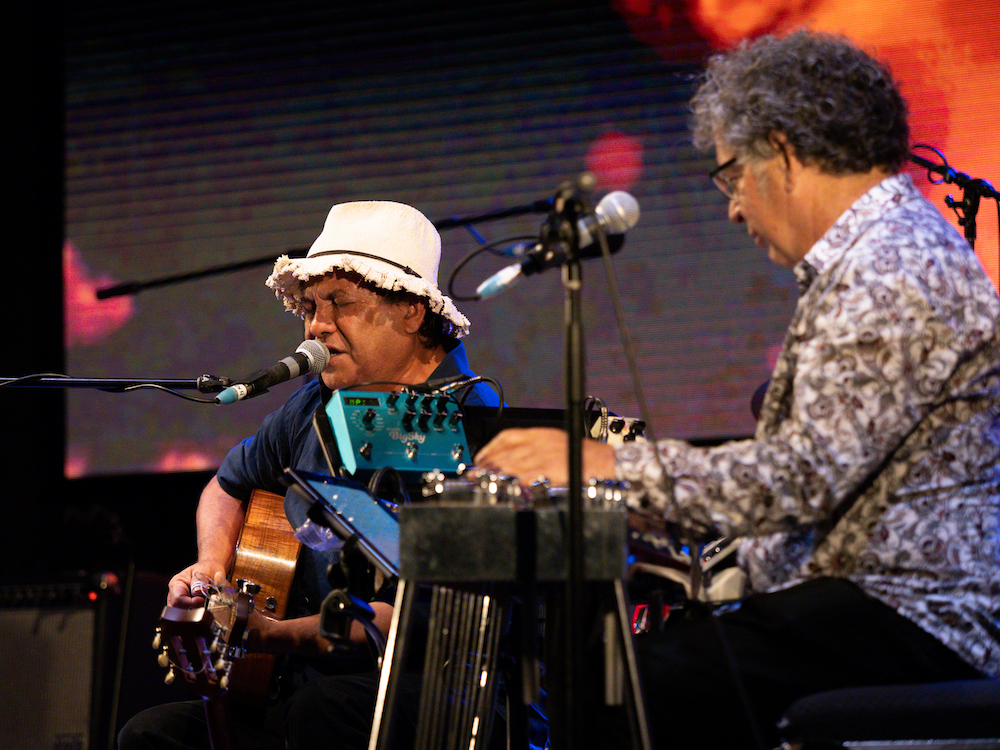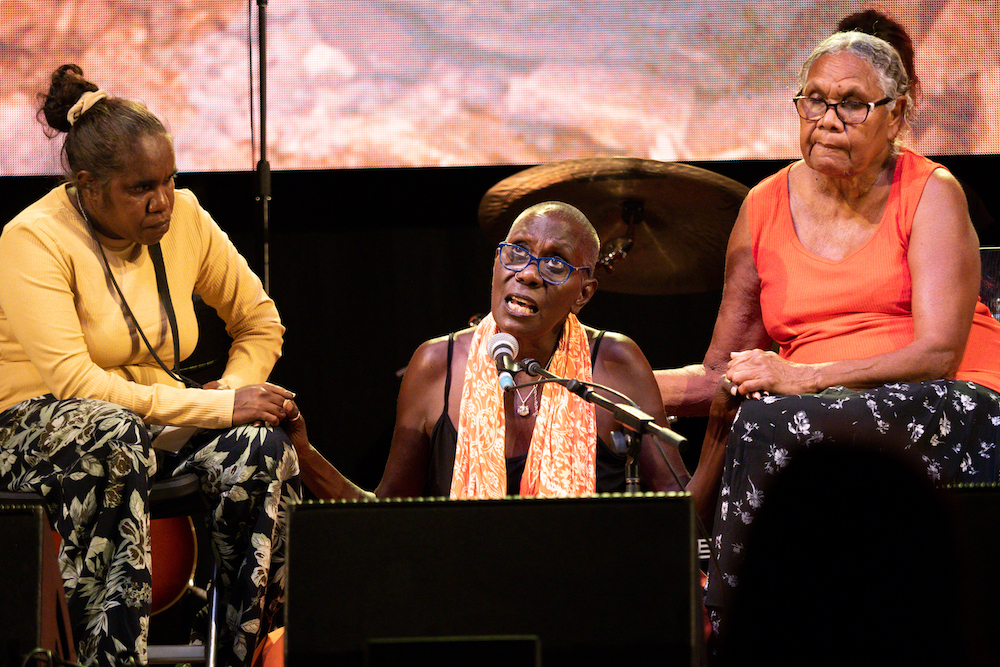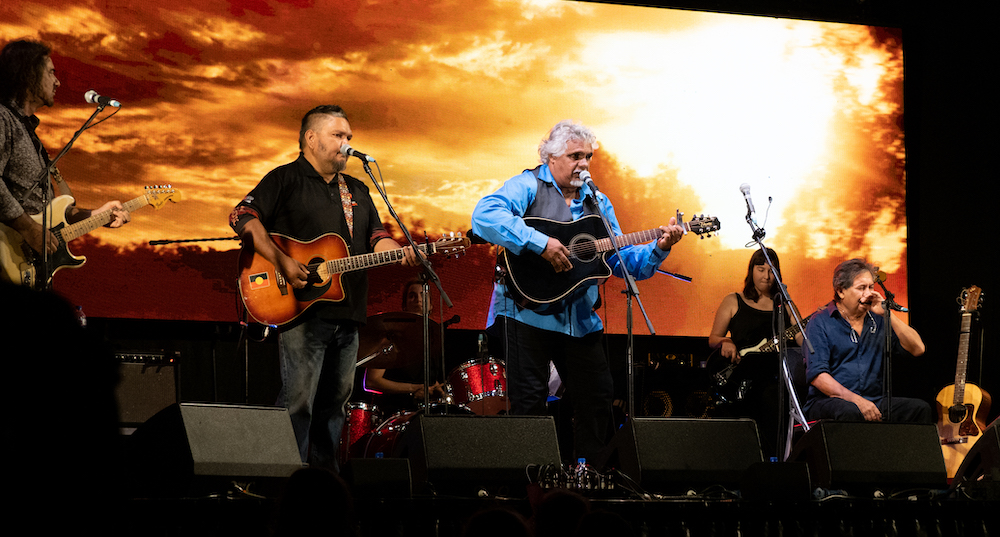A beautiful and uplifting evening on the shores of the Derbarl Yerrigan shows how hope and strength can rise from tragedy and oppression, David Zampatti writes.
Celebration of music’s transforming power
28 February 2022
- Reading time • 7 minutesPerth Festival
More like this
- Rewriting tradition with skill and charm
- Close encounter stirs the soul
- The great unknown
Songs for Freedom, Big hART ·
Dyoondalup/Point Walter Reserve, 26 February 2022 ·
A perfect night at the end of Perth’s endless summer on the banks of the Derbarl Yerrigan in Whadjuk Noongar boodja, Songs for Freedom is a celebration of country, freedom and peace. A group of diverse, talented and committed artists have come together to perform the songs of the people of Ieramugadu (Roebourne) from over a decade of community involvement that has created close to 100 songs.
We also hear songs from around Ngarluma Country, Walmajarri Country in the Kimberley, Noongar Country, Yamatji (Murchison) and Wongatha (Goldfields) lands. The result is joyous, life affirming and defiant in the face of historic oppression and neglect.

Its seeds were planted by two events, the closure of a paper mill in Burnie, Tasmania in April 1992, and the lonely death of a young Yindjibarndi boy, John Pat, in Roebourne, Western Australia, in September 1983.
The paper mill closure inspired the foundation of Big hART, the extraordinary arts organisation that has since worked in 50 disadvantaged Australian communities to tell their stories and support their people. The death in police custody of John Pat has led, despite many and continuing setbacks, to exposure of the issues surrounding First Nations people and the criminal justice system, and its often tragic outcomes.
The body of work and the strengthening of community arising from Big hART’s 11 years involvement in the New Roebourne project is one of the most important continuing artistic endeavours in the country.
Its tour de force, the extraordinary Hipbone Sticking Out (2014), shocked me with its brutality, its humour and its cultural and historical literacy. It remains a milestone in Australian theatre.
But Big hART’s immersion in the Roebourne community is not just one magnificent play; there are workshops with local people from eager kids to wise elders, from women in the regional prison to musicians from other country who come to share what is being built in the little town.
So Songs for Freedom, in collaboration with Perth Festival and City of Melville, is much more than a concert; it’s an affirmation of the world’s oldest continuing culture and its resilience, forged by connection to ancient lands, family and community practices.

That culture is also strengthened by its ability to engage with, and assimilate, others that share its directness and soul. So this music is also a deep dive into other roots music, especially Americana and the Afro-American blues.
Enter the celebrated pedal steel player and musicologist Lucky Oceans, whose leadership and virtuosity has brought 17 diverse musicians together for 24 songs of wonderful variety.
The Freedom Band (Oceans, guitarists David Hyams and Tyson Mowarin, vocalist Naomi Pigram, bass player Kate Pass and drummer Talia Valenti) is a group you’d queue to see anywhere in the world.
With playing like that behind you, an artist can reach for the stars, and from Ngarluma singer-songwriter Mowarin’s plain-speaking opener, “Our Ways Our Stories”, to his “Ngarndu Ngurra (My Land)” that closes the set, that’s exactly what they do.
Read an interview with ‘Songs of Freedom’ artist Lois Olney.
While quite a few of the concert’s numbers have been devised in workshops as recently as last week and some still need to marinate and refine, songs like the majestic Lois Olney’s country blues “Stuck in the City”, Karratha-based singer Fred Ryan’s “Little Town Big Heart” and the fabulous rollicking creole shanty “Why” by Walmajarri artist Kankawa Nagarra and the Irish folk singer Ciaron O’Sullivan are instant ear-worms.
Nothing exemplifies the spirit of freedom from people too often denied it more than “If I Ever Get Out of Here”, written in Roebourne Regional Prison with lines contributed by female inmates, and Naomi Pigram’s “Someone to Someone”, inspired by her time with the women and featuring an incandescent harmonica and pedal steel duet by Oceans and Steve Pigram).
Kalgoorlie artist Delson Stokes performs two songs, “Wanted Out”, featuring a fiery slide solo from Oceans, and “Burning Daylight”, both written by Roebourne prison inmates.

The set closes with Ryan’s anthemic “Songs of Freedom” that became the title of the concert: “A song for this land girt by sea/ But I want to hear a song for me”.
The third set, Peace, begins with “Tribute to My Family”, written by John Pat’s family member Rose. It’s a simple, heartfelt song, like many in the program, but that simplicity leads you back to where they came from, and what they say.
If Lucky Oceans is the cornerstone of Songs of Freedom, the celebrated, unmistakable Stephen Pigram is its wings. “Mimi”, his achingly lovely tribute to his maternal grandmother takes us away to other places and times, and “Dry Riverbed”, set in the Kimberley spinifex country, powers us home.
And this is only a selection of the artists who perform in front of the superb visuals created by media artist Jordan East alongside countless filmmakers and Roebourne’s young people over the years; if water never looks so blue, the Pilbara country so rust-red, the faces of the kids so bright and alive as they do in the sparkling sunshine or the firelight of these films, it only brings more life and joy to this most inspiring of musical events.
Pictured top: Tyson Mowarin and Naomi Pigram. Photo: Linda Dunjey
Like what you're reading? Support Seesaw.





